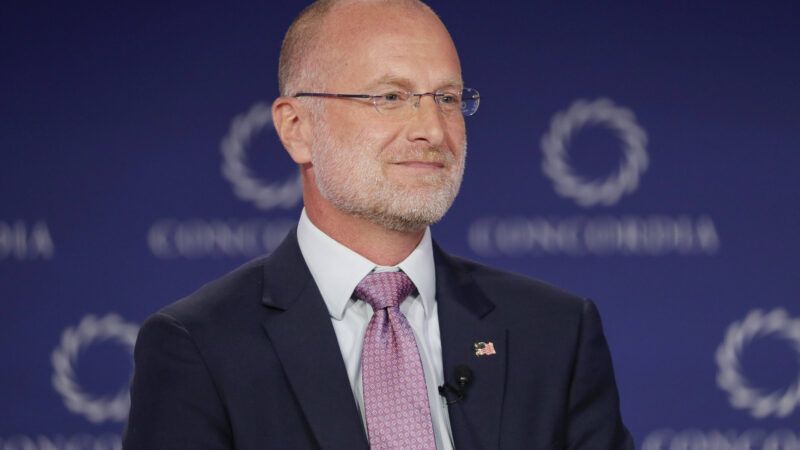60 Years Ago, Ayn Rand Denounced FCC Censorship. Brendan Carr Should Listen.
In her 1962 essay "Have Gun, Will Nudge," Rand explained exactly how the public interest standard would lead to censorship.

Federal Communications Commission (FCC) Chair Brendan Carr has received much criticism after appearing to pressure broadcast channels to take Jimmy Kimmel off the air following the comedian's misinformed monologue about the motivations of Charlie Kirk's alleged killer. Republican Sens. Rand Paul (R–Ky.), Ted Cruz (R–Texas), and Dave McCormick (R–Pa.), all chastised Carr for seemingly using his position to steer the editorial decisions of private companies—a serious breach of free speech principles.
Carr is not without his defenders, however. Nathan Leamer, tech policy expert and advisor to former FCC Chair Ajit Pai, asserts that Carr's actions fall squarely within his duty to promote the "public interest" on television, as defined by the Communications Act of 1934. He also assails "libertarians" in particular for not caring about how the FCC works (his words), and suggests that such skeptics are incorrectly or selectively railing against the public interest standard in the Kimmel case.
But of course, libertarians have been warning that broad interpretations of the public interest standard will empower the FCC to engage in censorship for decades. Just ask Ayn Rand.
In 1962, Rand penned a prophetic warning about the public interest standard, which then FCC Chair Newton Minow was citing as justification for pressuring television companies to create more educational programming. Minow famously railed against a supposedly "vast wasteland" of shoddy television shows, and claimed that the FCC's charter empowered him to push for editorial changes to the medium that would align with his view of the public interest.
"You must provide a wider range of choices, more diversity, more alternatives," said Minow in his well-remembered 1961 speech. "It is not enough to cater to the nation's whims; you must also serve the nation's needs."
Minow repeatedly claimed that he was not in favor of government censorship, and was not trying to tell broadcasters what they could and could not say. Rather, he charged them to make nebulous and ill-defined improvements to the product that he believed would be better appreciated by the American public—i.e., the public interest.
And that's precisely what Rand disliked about his approach. Her essay, "Have Gun, Will Nudge," published in The Objectivist Newsletter in March 1962, makes clear her disdain not just for abject censorship, but also for a reality in which the FCC chair makes vague statements regarding the actions that private actors should or should not take.
"It is true, as Mr. Minow assures us, that he does not propose to establish censorship; what he proposes is much worse," she wrote. She continued:
Censorship, in its old-fashioned meaning, is a government edict that forbids the discussion of some specific subjects or ideas—such, for instance, as sex, religion or criticism of government officials—an edict enforced by the government's scrutiny of all forms of communication prior to their public release. But for stifling the freedom of men's minds the modern method is much more potent; it rests on the power of non-objective law; it neither forbids nor permits anything; it never defines or specifies; it merely delivers men's lives, fortunes, careers, ambitions into the arbitrary power of a bureaucrat who can reward or punish at whim. It spares the bureaucrat the troublesome necessity of committing himself to rigid rules—and it places upon the victims the burden of discovering how to please him, with a fluid unknowable as their only guide.
No, a federal commissioner may never utter a single word for or against any program. But what do you suppose will happen if and when, with or without his knowledge, a third-assistant or a second cousin or just a nameless friend from Washington whispers to a television executive that the commissioner does not like producer X or does not approve of writer Y or takes a great interest in the career of starlet Z or is anxious to advance the cause of the United Nations?
What makes it possible to bring a free country down to such a level? If you doubt the connection between altruism and statism, I suggest that you count how many times—in the current articles, speeches, debates and hearings—there appeared the magic formula which makes all such outrages possible: "The Public Interest."
The title of the essay was inspired by Rand's contention that a man who holds a gun to your head and demands your wallet is surely deploying impermissible force rather than mere encouragement. When the FCC chair proclaims that a private company can "do this the easy way or the hard way," he is providing a similar kind of nudge.


Show Comments (79)